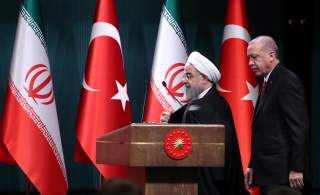Is a Geostrategic Shift in the Middle East in the Offing?
Washington is doing itself a great disservice by alienating Ankara and Tehran simultaneously.
The American decision to terminate the waiver on the purchase of Iranian oil has further embittered relations between Turkey and the United States. Iran is the second-largest supplier of energy to Turkey. Additionally, Ankara and Tehran have overlapping interests relating to the threat of Kurdish secessionism, antipathy toward Saudi Arabia and support for Qatar that faces Saudi embargo, and share several other regional issues. Turkey considers the American decision a derogation of its sovereignty. Turkish foreign minister Mevlut Cavusoglu criticized the American decision and declared, “We do not accept unilateral sanctions and impositions on how we build our relationship with our neighbors.” Even if Turkey reluctantly accepts the American decision at least partially in order to escape sanctions, it will add to the list of grudges Ankara harbors against Washington.
In the midst of this downward spiral in U.S.-Turkey relations, SHAPE headquarters committed what it admitted was an “error of protocol” by inviting a Greek Cypriot delegation to a ceremony on May 3 held to induct U.S. Air Force Gen. Tod Wolters as the new Supreme Allied Commander for Europe. Acrimony surrounded the event as Turkey boycotted the ceremony in protest further adding to the ill will already evident in U.S.-Turkey relations.
While both the United States and Turkey share blame for the deterioration in their relations, once again the major beneficiary of the weakening of the relationship between the two NATO allies with the largest armed forces in the alliance is Russia. Turkey is adamant that it will not rescind its S-400 decision. In fact, the Turkish defense minister announced last month that Turkey is likely to receive its first S-400 air-defense missile systems as early as June instead of the earlier July date.
Turkey and Russia already appear to be on the same page with regard to Syria now that Ankara has reconciled itself to Assad remaining in power and Russia has signaled its support for Turkey’s position on YPG and the Kurdish enclave. Turkey, Iran and Russia have been meeting to decide the future of Syria. The fourth summit of the three powers on Syria was held in Sochi in February and consultations continue to devise a solution to Syria acceptable to the three countries to the exclusion of the United States.
These trends in America’s dealings with Iran and Turkey depict the common theme that the United States is doing irretrievable damage to its relations with the two most important regional powers in the Middle East. In other words, these developments indicate that there may be a major strategic shift in the offing in the Middle East with Moscow as its major beneficiary. This does not bode well for Washington’s overriding objective of constructing a stable and legitimate structure of security in the Middle East with American as its principal external guarantor. Such a structure of security cannot be established without the participation of Ankara and Tehran and the United States may be doing itself a great disservice by alienating them simultaneously.
Mohammed Ayoob is University Distinguished Professor Emeritus of International Relations, Michigan State University, and a senior fellow for the Center for Global Policy. His books include The Many Faces of Political Islam and, most recently, Will the Middle East Implode and editor of Assessing the War on Terror.
Image: Reuters

